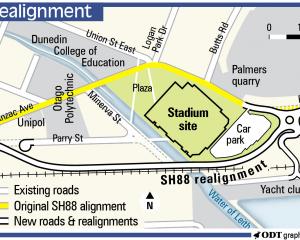That decision required applicants to provide an assessment, including a cost-benefit analysis, of any alternative proposals, placing an impossible onus on applicants to prove there was no better alternative than their project.
They would have to provide a cost-benefit analysis of each alternative, including valuing intangibles.
"How is the applicant reasonably expected to do that?"The requirement to prove there is no better option is therefore an impossible hurdle to clear," Mr Rennie said.
Meridian, the Central Otago District Council and the Otago Regional Council have appealed the Environment Court's decision to decline consents for the proposed $2 billion, 176-turbine wind farm on the Lammermoor Range.
The five-day hearing began yesterday before Justices Lester Chisholm and John Fogarty.
The respondents include several environmental groups and individuals.
Hugh Rennie and Andrew Beatson appear for Meridian Energy; Alastair Logan for the Central Otago District Council and Otago Regional Council; and Justin Smith, Morgan Slyfield and Mike Holm for the remainder of the respondents, with the exception of Roch Sullivan.
Meridian has asked for the Environment Court's decision to be quashed and consent granted.
Justices Fogarty and Chisholm said it was the first time they had received such an approach.
Mr Rennie said if it was not possible to quash the decision, the matter should go back to the Environment Court to be reconsidered or for a rehearing. It was clear the new test and Meridian's "failure to meet it" played a material part in the court declining consent.
The test was first mentioned by the court in its decision and was unprecedented in 20 years of operation of the Resource Management Act, he said.
"The test effectively invites, or requires, competing generators to contest the application by presenting their projects and then for applicants to disparage those projects."
Meridian was told it "failed the test" with the cost-benefit analysis it presented to the Environment Court.
"The court, as it were, marked our exam paper three out of 10 and said try again and sent it back."
Although the court said "realistic alternatives" to Project Hayes should have been considered and there were plenty of possible renewable-generation projects in the planning pipeline, it could not assume any one of those projects would come to fruition.
More than one generation project was needed to meet New Zealand's growth in demand for power and there was an urgent need for further electricity generation, Mr Rennie said.
Meridian's wind farm site-selection process was thorough, involving a broad combination of factors such as terrain, accessibility, elevation and the likelihood of receiving consents.
It had called evidence at the Environment Court hearing to say there was no other site in the South Island with characteristics comparable to the Hayes site.
The potential of the site had been recognised more than 20 years ago, he said.
If the court had a concern about the scale of the project, it could have imposed conditions on the size of project.
Although the Environment Court perceived it as an "all or nothing" proposal, evidence was given there were five sections within the wind farm, which should have provided a clear indication Project Hayes could be constructed in stages, with some stages capable of being left out, Mr Rennie said.
The hearing continues today.



